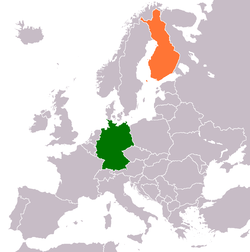Top Qs
Timeline
Chat
Perspective
Finland–Germany relations
Bilateral relations From Wikipedia, the free encyclopedia
Remove ads
Finland–Germany relations are the bilateral relations between the Finland and Germany. Both countries are part of the European Union, are signatories of the Schengen Agreement, and are members of the eurozone and NATO. Germany fully supported Finland's application to join NATO, which resulted in membership on 4 April 2023.[1]
Remove ads
History
Summarize
Perspective



Relations between both nations began after the German Empire recognised the newly independent Finnish state on January 4, 1918. In the ensuing Finnish Civil War, Germany played a prominent role siding with the White Army and training Finnish Jägers.[2] In one of the decisive battles of the war, German troops took Helsinki in April 1918.[3]
During World War II, the secret protocol in Molotov–Ribbentrop pact enabled the Winter War (1939–40), a Soviet attack on Finland. Finland and Nazi Germany were "co-belligerents" against Soviet Union during the Continuation War (1941–44), but a separate peace with Soviet Union led to the Finnish-German Lapland War (1944–45).
Finland recognised both the Federal Republic of Germany and the German Democratic Republic (West and East Germany) in 1972 and it established diplomatic relations with East Germany in July 1972 and with West Germany in January 1973.[4] In July 2022, Germany fully approved Finland's application for NATO membership.[5]
Remove ads
Resident diplomatic missions
Finland also has a consulate general in Hamburg, two honorary consulates general in Düsseldorf and Munich.
- Embassy of Finland in Berlin
- Embassy of Germany in Helsinki
See also
References
Further reading
External links
Wikiwand - on
Seamless Wikipedia browsing. On steroids.
Remove ads



